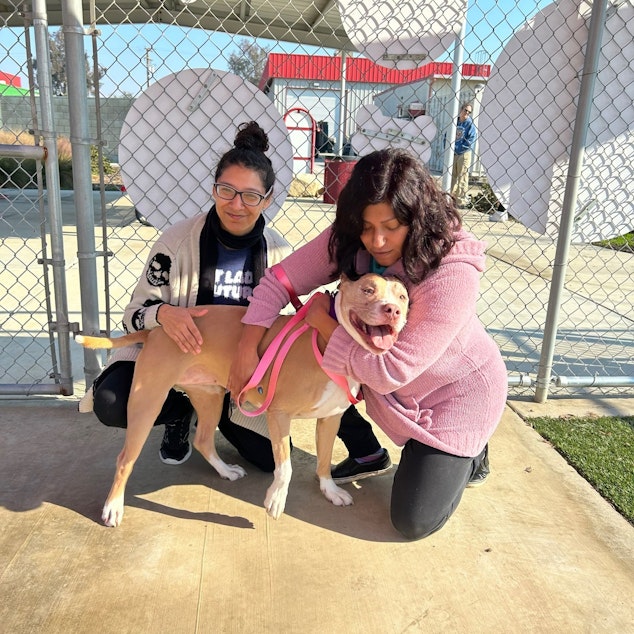Dogs are being surrendered more in Seattle area because of soaring pet food costs, inflation

Seattle-area shelters have been deluged by families surrendering their beloved pets — not because they don't want them anymore —but because they simply cannot afford the rise in pet food, or because they have had to move in with other relatives to afford the rent, and their pup can't make it.
Three years ago a dog named Sadie was taken to the Seattle Humane shelter in Bellevue. Sadie's owners were going through a tough time and had to move to California for work.
But Sadie couldn't join them.
"She was an American Staffordshire Terrier. She's a little bit older, very sweet,” said Jennifer Garcia, rescue coordinator for Tulare Animal Services in central California, the region where Sadie's owners relocated. Garcia said the family had had Sadie most of her life and the decision to leave her behind wasn’t easy.
Sadie was at Seattle Humane for about a month until a new family came in and adopted her.
But, like with her first family, this didn’t work out. Last fall Sadie was returned to Seattle Humane for the second time.

Her story is one of hundreds that the Bellevue shelter hears every week — families who love their pets but for one reason or another just can't keep them.
"No one's here because they want to,” said Jess Charlton, intake manager at Seattle Humane. “Honestly, often we hear it's like the saddest day of their life and so we hold a lot of space for grief and trauma that's occurring for that person and the pet."
Charlton said people often have to give up their pets if their living situation changes, like they move into an apartment that doesn't allow animals or has an expensive pet deposit.
"Those types of things happen all the time,” Charlton said, “or, ‘I'm moving. I have to move in with my family, it's a multi-generational family living situation. We can't have all of our pets. Maybe we get to keep one.’ And then we help support that decision."
So far this year, Charlton has seen a huge increase in the number of pets being surrendered. Seattle Humane was expecting to take in about 4,500 animals. Instead the shelter is on pace to accept closer to 7,000.
"On average we'll have 100 requests in our inbox and we're receiving about 50 voicemails a day,” Charlton said.
The caseload has picked up to the point that people typically have to wait about a week from the time they contact Seattle Humane to when they can bring their pet in. People first fill out a pre-surrender questionnaire, or PSQ. Charlton says sometimes pet owners can't wait that week between filling out the paperwork and going to the shelter.
"This is the first time that I've seen someone post, ‘I found this pet, I found this dog, or I found this group of pets,’ and I'm like, ‘We have a PSQ for that pet,’" they said.
This increase in pet surrenders and some abandonments are indicators of what's happening in the community more broadly, Charlton said. Just look at the price of pet food, they said.
John Fleshman knows about the price of dog food. Fleshman owns Denny’s Pet World in Kirkland, a business that has been operating for almost 50 years.
Fleshman said price increases from food manufacturers since the start of the pandemic have been “amazing.”
“Normally dog food companies would raise their prices once a year,” he said. “Some of them last year, in the last couple years have raised at four times in one year. We couldn't keep up with it. We had to have a person, that's all she did was just raise prices.”
Seattle Humane says volunteers have stepped up with food donations and pet fostering to help with the demand. And sometimes they even see surprising outcomes.
Like Sadie, the Staffordshire Terrier who was returned to the shelter twice.
In December, Sadie’s first family, who had moved to California, saw their old dog was up for adoption again.
They decided they were stable enough to bring Sadie home.
Shortly after, Seattle Humane coordinated with Tulare Animal Services to drive Sadie south.
"They were a little nervous to see if she remembered them and she's a little bit shy so it took her a second to kind of warm up,” said Jennifer Garcia at Tulare, “but she was very happy to see her people. She was happy to jump in the car and go home with them and I heard she's doing really well."





